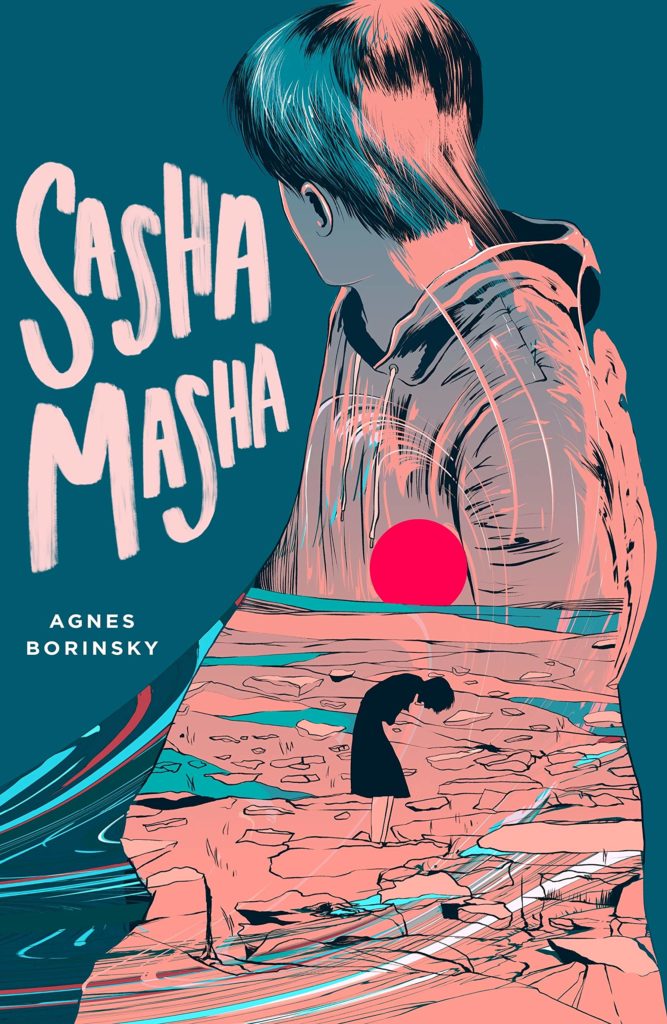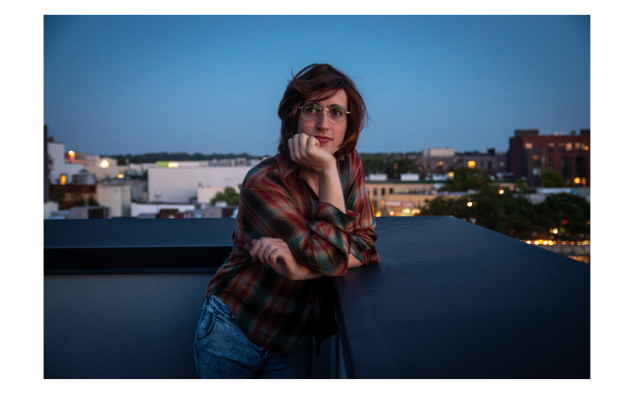Reading Sasha Masha, I knew this book was something special. This ownvoices book about questioning our identity is one that I know will touch so many lives. Afterwards I knew I had to see if the author would talk to me about Sasha Masha. Welcome to my interview with Agnes Borinsky about her debut, Sasha Masha.
Summary

Alex feels like he is in the wrong body. His skin feels strange against his bones. And then comes Tracy, who thinks he’s adorably awkward, who wants to kiss him, who makes him feel like a Real Boy. But it is not quite enough. Something is missing.
As Alex grapples with his identity, he finds himself trying on dresses and swiping on lipstick in the quiet of his bedroom. He meets Andre, a gay boy who is beautiful and unafraid to be who he is. Slowly, Alex begins to realize: maybe his name isn’t Alex at all. Maybe it’s Sasha Masha.
Find Sasha Masha on Goodreads, Amazon, Indiebound, Bookshop.org & The Book Depository.
Author Interview
Was Sasha Masha the first book/story you’ve written? What was your journey to this book like?
I’ve mostly written essays and plays, at least one of which has ended up in book form. But this is my first novel. The process started with an invitation to join an incubator group for YA fiction by playwrights — and the story snuck up on me from there.
Can you talk about the first time you felt represented by a book, TV show, movie, etc?
Watching the Netflix documentary Disclosure recently I realized how many images of trans folx had ended up in my imagination from movies I watched as a kid. And mostly kind of terrible depictions. (Like… Silence of the Lambs? I loved that movie. Oof.) So there are the images I was maybe drawn to when I was young, in spite of everything — whether it was trans performers in theater, or queer people in the arts more generally. And then there are the representations that I’ve encountered in the last few years that I can say more consciously resonate with my experience.
But hm. What are some of those early memories? I remember reading Jan Morris’s Conundrum when I was weirdly young, and loving it, though I didn’t quite understand why at the time. And I remember connecting to the figure of Tiresias in Greek mythology, who lived as both a woman and a man. I put her into an early play of mine, and — again — I don’t think I understood why.
Do you have some other transgender story recommendations?
I love Kacen Callender’s books. Their recent YA novel, Felix Ever After, is terrific. Akwaeke Emezi is writing about transness in brilliant ways. Freshwater and Death of Vivek Oji are both so great. My friend Chana Porter has a book called The Seep with a trans protagonist that is effing amazing. And then there are memoirs and diaries — Lou Sullivan’s diaries, which just got edited as We Both Laughed in Pleasure, I spent a lot of time crying as I read. And classics, like Stone Butch Blues. (Maybe not technically trans? But certainly trans-adjacent.) Or Bambi Lake’s memoir — she just passed.
And then also, like, the Bible? There are trans people in the Bible. And in Greek traditions, and Hindu, and Native American… We’re in a golden age of trans representation in art and culture in the last few years, but trans stories are certainly nothing new.
There’s a lot to discover, once you start looking.
Names are tremendously important, did you always know the book would be called Sasha Masha?
“I think it’s about a kid named Alex who realizes or decides that his name is Sasha Masha.” That’s all I knew when I started. Writing the book became about figuring out what that meant.
What are your favorite elements of the cover that readers might not pick up immediately?
Carolina Rodríguez Fuenmayor did such an amazing job. The figure in silhouette looks like they’re in some kind of rocky landscape — or maybe on, like, a disintegrating ice crust? And I don’t know how she came up with that. But it feels perfect for the feeling that happens when you’re afraid your life is going to fall apart because of something you’re about to say or do. Sasha Masha is lucky, in that I think as readers we know their life isn’t going to actually come apart in the way that it sometimes does for a lot of trans folx. But the emotion feels real to me, and I feel like Carolina captured something about it perfectly.
Who are some of your favorite side characters in Sasha Masha?
Ugh. I mean, I just made up a bunch of people I wanted to hang out with. I miss spending as much time with Mabel and Andre as I was when I was writing.
If you could tell readers one thing before beginning Sasha Masha, what would you say?
I mean, thanks for reading! And thank you, Lili, for these questions, and for writing about it. I guess I’d say that it’s definitely a story about transness, and queer community. But I also hope folks can connect to it as a story about trusting our guts about who we are. That we’ve all got some weird magic we’re bringing into the world, and that our task as humans is to make space for that magic to unfold — each others’ and our own.
Find Sasha Masha on Goodreads, Amazon, Indiebound, Bookshop.org & The Book Depository.
About the Author

Agnes Borinsky is a writer from Baltimore, now living in Los Angeles. She mostly writes essays and plays, and has collaborated on all sorts of projects in basements, backyards, gardens, circus tents, classrooms, bars, and theaters. Sasha Masha is her first novel.
One thought on “Interview with Agnes Borinsky”